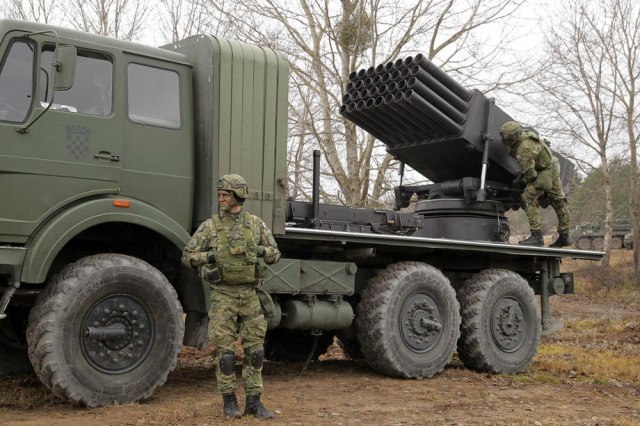Serbia and Bosnia-Herzegovina "surrounded" by NATO
Bosnia-Herzegovina and Serbia are two countries in the Western Balkans that are completely surrounded by NATO members.
Monday, 10.01.2022.
11:25

Serbia and Bosnia-Herzegovina "surrounded" by NATO
Both countries border Croatia, which has been in NATO since 2009. Serbia borders Hungary, which has been a member since 1999, as well as Romania and Bulgaria, which have been members since 2004. Bosnia-Herzegovina and Serbia border Montenegro in the south, which has been a member since 2017, and Serbia also borders North Macedonia, the newest NATO member, which has been in the Alliance for almost two years, according to "Nezavisne novine".The self-proclaimed Kosovo is not a member of NATO either, but it is a territory that neither Serbia nor BiH recognizes as an independent state.
The main and basic reason that BiH and Serbia are not members of the Alliance is the fact, as stated in the text on this portal, that the Serbian people are still strongly against membership. As things stand now, it is uncertain that this will change in the foreseeable future, and NATO in its official communications gives both countries freedom and the right to decide whether they want membership and what form of cooperation suits them, given that the Alliance's principle is respects local government decisions on the status of its country.
Serbia has a Partnership for Peace and regularly signs an Individual Partnership Action Plan with NATO. The official NATO website points out that this alliance respects the neutrality of Serbia.
"Serbia deepens political dialogue and co-operation with NATO on issues of mutual interest, such as an important focus on democracy, institutions and defense reform. Although Serbia aspires to EU membership, unlike other Western Balkan partners, it does not want to join the Alliance", it was emphasized in NATO.
Officially and formally, BiH aspires to NATO membership, because in 2009 the Presidency of Bosnia-Herzegovina sent a letter to the Alliance, expressing readiness to work on membership. As a result, at a summit in Tallinn next year, NATO called on BiH to join the Membership Action Plan, provided it resolves the issue of state and military property. NATO first insisted on resolving this issue for several years, and then, nevertheless, at the end of 2019, it decided to activate the MAP, although BiH did not resolve the issue of state and military property.
In the meantime, RS has changed its position on the Alliance, and emphasizes that it will not give its consent for BiH to become a member, and the document "Defense Review" has been sent to NATO within the MAP, which does not prejudge membership. At the same time, it is announced that RS will pass a law on resolving the issue of military and state property on its territory, Nezavisne writes.
"BiH's participation in the MAP does not prejudge any decision on membership. BiH should continue to implement democratic and defense reforms in order to fulfill its aspirations towards NATO and the EU and become a functional and democratic independent state," NATO stressed.
It should also be noted that before the letter from 2009, the joint Armed Forces of Bosnia-Herzegovina were formed, for which the current government and the current opposition in RS were in favor.
"In order for any country to be neutral, it is necessary for the interested military parties to mutually recognize neutrality. This happened, for example, with the SFRY, whose neutrality status was recognized by both NATO and the Warsaw Pact. Austria gained neutrality in a similar way. Finland and Sweden, while Switzerland gained its neutrality much earlier, for example, the USSR agreed to withdraw its troops from Austria after World War II in exchange for the Austrian government agreeing to military neutrality, which it did".
"Today, Russia wants Ukraine to accept neutrality in a similar way, in exchange for mediation on the disarmament of pro-Russian troops from the eastern part of Ukraine, but NATO, for now, does not show readiness to accept this proposal because the Ukrainian government, at least officially, still wants it. In NATO, they believe that the issue of neutrality of any country cannot be resolved without the will of the country involved," reads the text of the "Nezavisne".
"Unlike Ukraine, there is a much better chance of recognizing Serbia's neutrality, because the Serbian government and the Serbian people want neutrality in relation to both military blocs. If the issue of Ukraine is resolved, NATO and Russia can be expected to discuss the country's status. However, those negotiations would be further complicated by the status of self-proclaimed Kosovo, given that it was separated from Serbia thanks to NATO intervention in 1999, and Russia links the province's issue to a solution to Crimea's status in 2014," it is added in the article.

























































Komentari 1
Pogledaj komentare